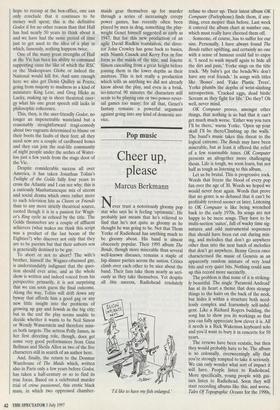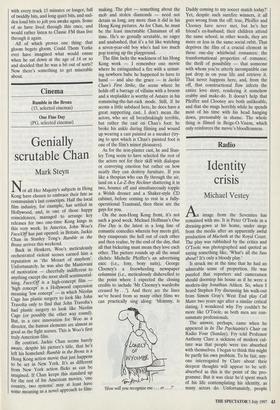Pop music
Cheer up, please
Marcus Berkmann
Never trust a notoriously gloomy pop star who says he is feeling 'optimistic'. He probably just means that he's relieved to find that he's not quite as gloomy as he thought he was going to be. Not that Thom Yorke of Radiohead has anything much to be gloomy about. His band is almost obscenely popular. Their 1995 album The Bends, though more miserable than several well-known diseases, remains a staple of hip dinner parties across the nation. Critics climb over each other to be nice about the band. Their fans take them nearly as seri- ously as they take themselves. Yet despite all this success, Radiohead resolutely `I'd like to have my fish enlarged.' refuse to cheer up. Their latest album OK Computer (Parlophone) finds them, if any- thing, even mopier than before. Last week it entered the album chart at number one, which must really have cheesed them off.
Someone, of course, has to suffer for our sins. Personally, I have always found The Bends rather uplifting, and certainly no one with a sense of humour could fail to enjoy it. 'I need to wash myself again to hide all the dirt and pain,' Yorke sings on the title track. 'My baby's got the bends/We don't have any real friends.' In songs with titles like 'Bones' and 'Fake Plastic Trees', Yorke plumbs the depths of wrist-slashing introspection. 'Cracked eggs, dead birds/ Scream as they fight for life.' Do they? Oh well, never mind.
OK Computer proves, amongst other things, that nothing is so bad that it can't get much much worse. 'Either way you turn I'll be there,' warns Yorke. 'Open up your skull I'll be there/Climbing up the walls.' The band's music takes this threat to the logical extreme. The Bends may have been miserable, but at least it offered the relief of a few reasonable tunes. OK Computer presents an altogether more challenging thesis. Life is tough, we soon learn, but not half as tough as listening to this album.
Let us be brutal. This is progressive rock. Words that freeze the blood of every pop fan over the age of 30. Words we hoped we would never hear again. Words that prove that no genre is so debased that it can't be profitably revived sooner or later. Listening to OK Computer is like being wrenched back to the early 1970s. Its songs are not happy to be mere songs. They have to be multi-section 'suites', full of wacky time sig- natures and odd instrumental sequences that should have been cut out during mix- ing, and melodies that don't go anywhere other than into the next batch of melodies that don't go anywhere. Benny Green once characterised the music of Genesis as an apparently random mixture of very loud bits and very quiet bits. Nothing could sum up this record more succinctly.
The problem is that some of it is striking- ly beautiful. The single 'Paranoid Android' has at its heart a theme that does strange things to the hairs on the back of the neck, but hides it within a structure both need- lessly complex and fearsomely self-indul- gent. Like a Richard Rogers building, the song has to show you its workings so that you can fully appreciate how clever it is. All it needs is a Rick Wakeman keyboard solo and you'd want to bury it in concrete for 50 years.
The reviews have been ecstatic, but then they would probably have to be. The album is so colossally, overweeningly silly that you're strongly tempted to take it seriously. We can only wonder what sort of impact it will have. People listen to Radiohead. More specifically, young people with gui- tars listen to Radiohead. Soon they will start recording albums like this, and worse. Tales Of Topographic Oceans for the 1990s, with every track 15 minutes or longer, full of twiddly bits, and long quiet bits, and sud- den loud bits to jolt you awake again. Some of us have lived through this once, and would rather listen to Classic FM than live through it again. All of which proves one thing: that gloom begets gloom. Could Thom Yorke ever have imagined what would ensue when he sat down at the age of 14 or so and decided that he was a bit out of sorts? Now there's something to get miserable about.



























































 Previous page
Previous page